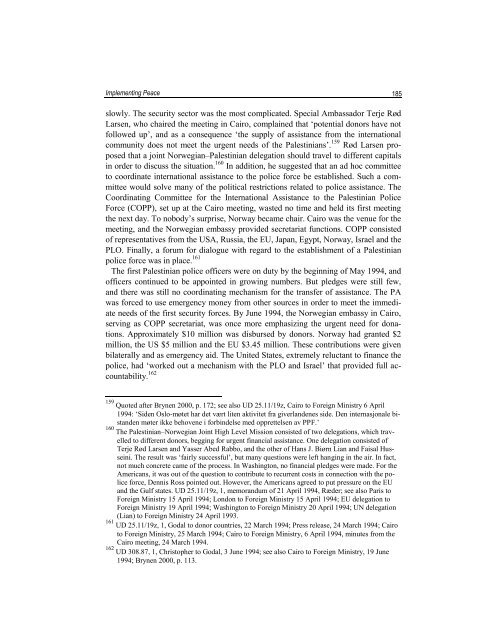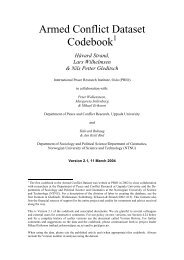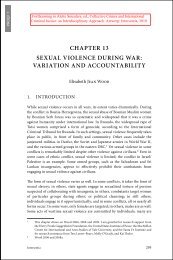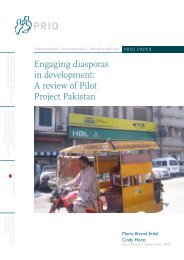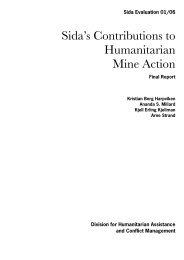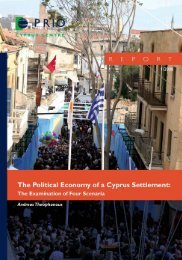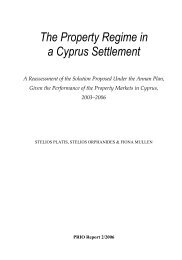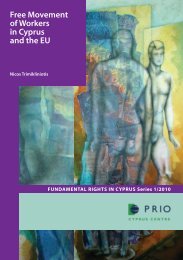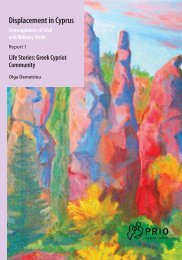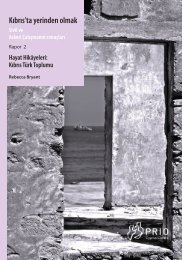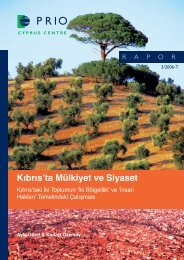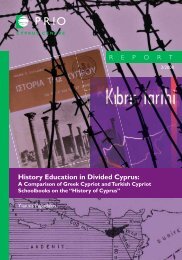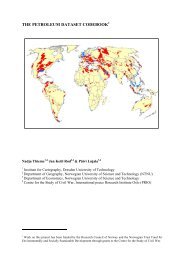Peacemaking Is a Risky Business - PRIO
Peacemaking Is a Risky Business - PRIO
Peacemaking Is a Risky Business - PRIO
Create successful ePaper yourself
Turn your PDF publications into a flip-book with our unique Google optimized e-Paper software.
Implementing Peace185slowly. The security sector was the most complicated. Special Ambassador Terje RødLarsen, who chaired the meeting in Cairo, complained that ‘potential donors have notfollowed up’, and as a consequence ‘the supply of assistance from the internationalcommunity does not meet the urgent needs of the Palestinians’. 159 Rød Larsen proposedthat a joint Norwegian–Palestinian delegation should travel to different capitalsin order to discuss the situation. 160 In addition, he suggested that an ad hoc committeeto coordinate international assistance to the police force be established. Such a committeewould solve many of the political restrictions related to police assistance. TheCoordinating Committee for the International Assistance to the Palestinian PoliceForce (COPP), set up at the Cairo meeting, wasted no time and held its first meetingthe next day. To nobody’s surprise, Norway became chair. Cairo was the venue for themeeting, and the Norwegian embassy provided secretariat functions. COPP consistedof representatives from the USA, Russia, the EU, Japan, Egypt, Norway, <strong>Is</strong>rael and thePLO. Finally, a forum for dialogue with regard to the establishment of a Palestinianpolice force was in place. 161The first Palestinian police officers were on duty by the beginning of May 1994, andofficers continued to be appointed in growing numbers. But pledges were still few,and there was still no coordinating mechanism for the transfer of assistance. The PAwas forced to use emergency money from other sources in order to meet the immediateneeds of the first security forces. By June 1994, the Norwegian embassy in Cairo,serving as COPP secretariat, was once more emphasizing the urgent need for donations.Approximately $10 million was disbursed by donors. Norway had granted $2million, the US $5 million and the EU $3.45 million. These contributions were givenbilaterally and as emergency aid. The United States, extremely reluctant to finance thepolice, had ‘worked out a mechanism with the PLO and <strong>Is</strong>rael’ that provided full accountability.162159 Quoted after Brynen 2000, p. 172; see also UD 25.11/19z, Cairo to Foreign Ministry 6 April1994: ‘Siden Oslo-møtet har det vært liten aktivitet fra giverlandenes side. Den internasjonale bistandenmøter ikke behovene i forbindelse med opprettelsen av PPF.’160 The Palestinian–Norwegian Joint High Level Mission consisted of two delegations, which travelledto different donors, begging for urgent financial assistance. One delegation consisted ofTerje Rød Larsen and Yasser Abed Rabbo, and the other of Hans J. Biørn Lian and Faisal Husseini.The result was ‘fairly successful’, but many questions were left hanging in the air. In fact,not much concrete came of the process. In Washington, no financial pledges were made. For theAmericans, it was out of the question to contribute to recurrent costs in connection with the policeforce, Dennis Ross pointed out. However, the Americans agreed to put pressure on the EUand the Gulf states. UD 25.11/19z, 1, memorandum of 21 April 1994, Ræder; see also Paris toForeign Ministry 15 April 1994; London to Foreign Ministry 15 April 1994; EU delegation toForeign Ministry 19 April 1994; Washington to Foreign Ministry 20 April 1994; UN delegation(Lian) to Foreign Ministry 24 April 1993.161 UD 25.11/19z, 1, Godal to donor countries, 22 March 1994; Press release, 24 March 1994; Cairoto Foreign Ministry, 25 March 1994; Cairo to Foreign Ministry, 6 April 1994, minutes from theCairo meeting, 24 March 1994.162 UD 308.87, 1, Christopher to Godal, 3 June 1994; see also Cairo to Foreign Ministry, 19 June1994; Brynen 2000, p. 113.


